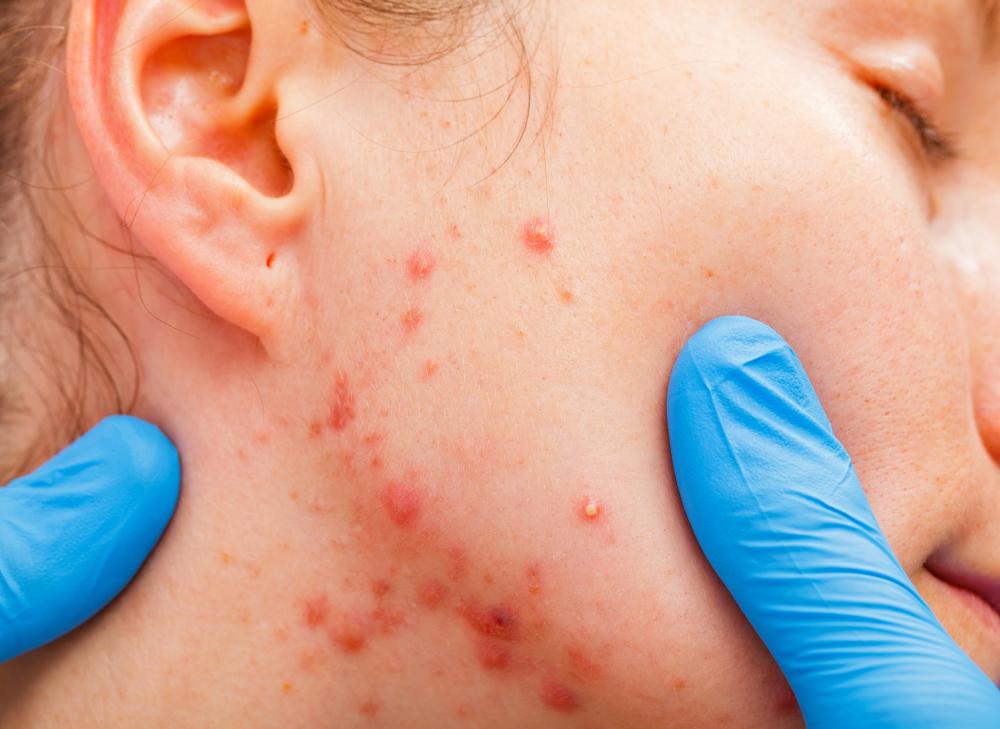At WiseGEEK, we're committed to delivering accurate, trustworthy information. Our expert-authored content is rigorously fact-checked and sourced from credible authorities. Discover how we uphold the highest standards in providing you with reliable knowledge.
What Is the Relationship between Corticosteroids and Acne?
The relationship between corticosteroids and acne is that corticosteroids are occasionally used to treat the condition. If a patient is suffering from severe acne, characterized by cysts and nodules over 1/5 of an inch (5 millimeters) in diameter, corticosteroid shots are often used as a treatment. Steroids contain anti-inflammatory properties and therefore can be used to reduce the inflammation seen with acne. Some doctors and clinical studies suggest that corticosteroids can actually worsen or cause acne, but this claim is hotly debated. A condition known as corticosteroid acne can manifest in adolescents treated with corticosteroids, but this can usually be cleared up by a reduction in dosage.
In most cases, the link between corticosteroids and acne is that corticosteroids are used to reduce the inflammation caused by acne. Steroids are commonly used to reduce inflammation, and the parts of the skin affected by acne experience a painful inflammation around blocked pores. Many non-steroid acne treatments are available, but corticosteroids usually provide a quicker result, which can improve patients’ morale and make them more willing to continue treatment. Corticosteroids can also decrease the likelihood of scarring as a result of severe acne.

Severe acne is often characterized by large cysts or nodules which start relatively deep down in the skin. These cysts can be painful for the patient, and are often unsightly and cause scars. The link between the two means injections of corticosteroids directly into the affected area can reduce inflammation and speed up healing. After the cyst or nodule has been injected with a corticosteroid, the inflammation decreases, reducing the pain felt by the patient, and the lump begins to heal. Topical treatments are often useless at fighting severe acne because the inflammation starts too deep in the skin.

Despite the generally positive relationship between corticosteroids and acne, the drug has been known to exacerbate acne in some cases. This is particularly pronounced in the case of adolescents and can result in corticosteroid acne, which essentially means that the drug induces more acne in the patient. Reduction in dosage is usually sufficient to combat this issue because the drug is often required to treat another condition. Some studies have also shown a possible link between the inhalation of corticosteroids and acne.

Cortisone, one type of corticosteroid, is made naturally within the body. This means that there is very little chance that patients will be allergic to it or suffer any adverse reactions. Corticosteroids and acne can therefore usually be combined with little concern for side effects. It is possible that patients will experience the affected area sinking into the skin like a crater, a reaction known as atrophy. This usually clears up within a few months.
AS FEATURED ON:
AS FEATURED ON:




















Discussion Comments
Corticosteroid shots that are injected directly into a cyst work well at flattening the cyst. But sometimes the shot causes a pit in skin. It happened to me. My doctor said that it will resolve over time but I'm not too sure.
There are advantages and disadvantages to this treatment. But it's not the first line of treatment, it's usually a last resort. So for severe acne, it's probably worth getting. I'm not sure if I will want to get it again though.
@fBoyle-- You might want to ask your doctor about this. Topical corticosteroids are used for allergic reactions, psoriasis and other skin conditions. I have not heard of it being used for acne, but I really don't know. Oral steroids and steroid injections are usually used for severe nodular/cystic acne.
I've had steroid injections in the past for my acne and they certainly worked. Steroids are amazing at resolving inflammation/swelling, so they can shrink cystic pimples very effectively. Some people worry about getting steroid acne as a side effect, but when someone's acne is already as bad as it can be, this is not very bothersome. I was certainly willing to bear the risk but had no side effects whatsoever. If I ever need steroid injections again for my acne, I won't hesitate to have them done.
Can a corticosteroid cream be used to treat acne? Or are the shots the preferred method of treatment?
Has anyone here used a corticosteroid for acne?
Post your comments